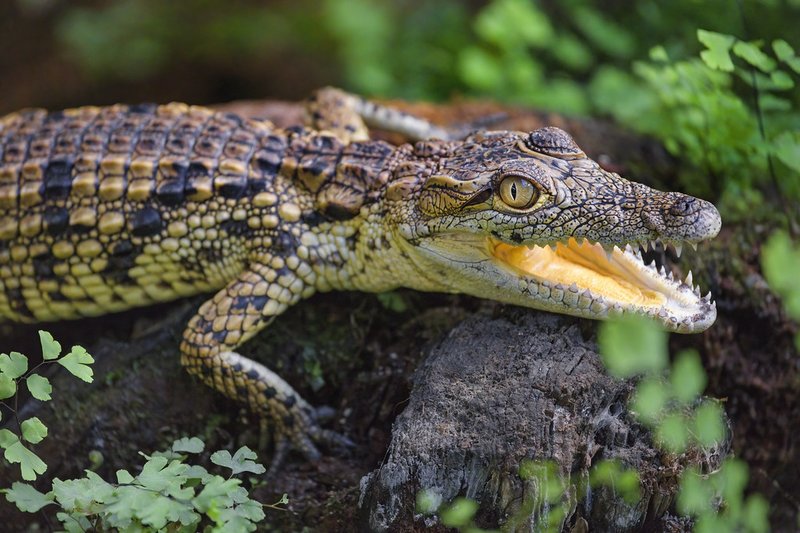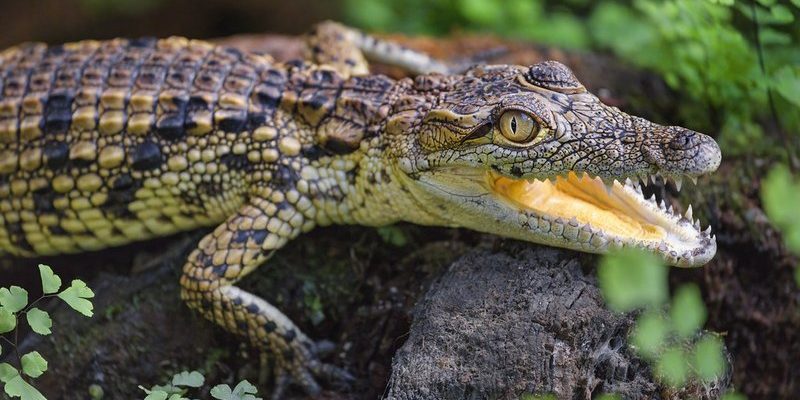
Think of the wild as a vast, unpredictable adventure—like being in a movie where the plot twists unexpectedly. Just as you wouldn’t rush in without a plan in a suspenseful scene, you shouldn’t face wildlife without a strategy. In this article, we’ll dive into practical steps and advice to keep in mind if you ever find yourself up close and personal with a crocodile.
Recognize The Signs of A Crocodile
Before you can react appropriately, it’s crucial to identify if what you’re seeing is indeed a crocodile. They often blend into their surroundings, sitting still on riverbanks or lurking in the water. Here are some signs to watch for:
- Body Shape: Crocodiles have a long, muscular body with a broad snout. If it’s basking in the sun, you might see the rough, scaly skin that gives them camouflage.
- Movement: Watch for sudden splashes or ripples in the water. Crocodiles can be stealthy swimmers but may also dart quickly on land.
- Sound: They can make hissing or growling noises if they feel threatened, which is a good cue to put some distance between you and the animal.
When spotting a crocodile, it’s like playing a game of hide and seek with a master! They can be faster and stealthier than you’d expect, so staying alert is key.
Stay Calm and Assess Your Surroundings
If you see a crocodile, your first instinct might be to panic or run. But here’s the thing—calmness is crucial. Take a deep breath and quickly assess where you are. Are you near water? Is there an escape route available?
Moving too fast can catch the crocodile’s attention, so instead, try to back away slowly. The last thing you want is to provoke it. Remember, crocodiles are creatures of instinct; they react to sudden movements. Try to keep your body relaxed and don’t make eye contact, as this can be perceived as a challenge.
Think of it like being in a standoff in a movie—no sudden moves, and recognize that the crocodile may be just as curious about you as you are about it.
How to Safely Distance Yourself
Once you’ve identified the crocodile and assessed your surroundings, the next step is to create distance between you and the creature. Here’s how to do it effectively:
- Back Away Slowly: Move away from the crocodile while maintaining a calm demeanor. Avoid turning your back on it and keep facing the animal as you retreat.
- Use Objects for Barriers: If you’re near a boat or a sturdy tree, use it as a barrier between you and the crocodile for extra safety.
- Don’t Run: Running can trigger their instinct to chase. Instead, walk steadily and avoid sudden movements.
Imagine you’re walking away from an awkward conversation—slow and steady is the key to slip away without creating a scene.
When to Seek Help
Sometimes, situations can escalate, and you might find yourself feeling really uneasy. If you feel like you’re in danger, it’s time to call for help. Here are some instances when reaching out is necessary:
- Very Close Proximity: If the crocodile is too close for comfort, don’t hesitate to reach out to local wildlife authorities.
- Injured or Aggressive Behavior: If the crocodile appears to be in distress or acting aggressively, it’s best left to the professionals.
- Frequent Sightings: If you’re in an area where crocodiles are commonly seen, make sure to report it so that safety measures can be taken.
Think of these experts as your personal wildlife guides—they know how to handle these situations and can provide safety tips tailored to the area.
Understanding Crocodile Behavior
To handle an encounter better, it helps to understand crocodile behavior. These reptiles are known for their territorial nature and strong prey instincts. Here’s what you should know:
1. Territorial Instincts: Crocodiles can be very protective of their space. If you get too close, they may feel threatened and react defensively.
2. Hunting Patterns: They often hunt during dawn and dusk. So, if you’re exploring during these times, be extra cautious.
3. Basking Behavior: Crocs love to bask in the sun, and that’s when they’re most visible. They’re usually lethargic at this time but don’t mistake their stillness for harmlessness.
In essence, understanding these behaviors can help you predict how a crocodile might react, which allows you to navigate your way safely through an encounter.
Educate Yourself Before Your Adventure
Knowledge is power, especially in the wild! Before setting out on your adventure, take the time to research the area you plan to explore:
- Local Wildlife Guidelines: Many parks and areas have information about local wildlife, including crocodiles. Familiarizing yourself with this can help you feel more prepared.
- Safety Protocols: Each region may have different safety protocols regarding wildlife encounters. Always check these guidelines.
- Guided Tours: If you’re new to an area known for crocodiles, consider joining a guided tour. These experts can teach you about crocodile safety while providing a fun experience.
Think of it as prepping for a big game—you don’t go into a match without knowing the rules, right? Understanding how to navigate a crocodile encounter enhances your appreciation for these animals while helping you stay safe.
Final Thoughts
Finding yourself face-to-face with a crocodile can be a heart-pounding experience. But remember, staying calm and knowing what to do is your best tool for safety. Recognize the signs, assess your surroundings, and distance yourself carefully.
Also, educate yourself before heading into the wild. Nature is full of beauty and wonder—crocodiles included—but it’s essential to respect their space and habits. Always prioritize your safety, and enjoy the great outdoors with a little more knowledge and confidence!

